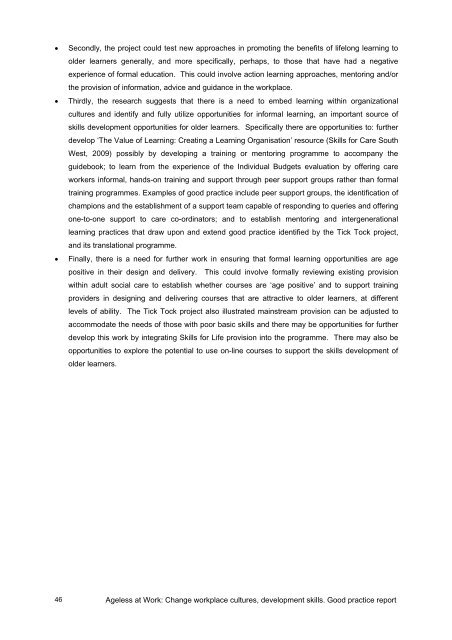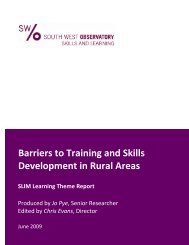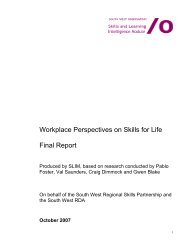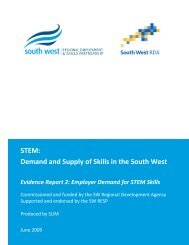Ageless at Work - Skills for Care
Ageless at Work - Skills for Care
Ageless at Work - Skills for Care
You also want an ePaper? Increase the reach of your titles
YUMPU automatically turns print PDFs into web optimized ePapers that Google loves.
Secondly, the project could test new approaches in promoting the benefits of lifelong learning to<br />
older learners generally, and more specifically, perhaps, to those th<strong>at</strong> have had a neg<strong>at</strong>ive<br />
experience of <strong>for</strong>mal educ<strong>at</strong>ion. This could involve action learning approaches, mentoring and/or<br />
the provision of in<strong>for</strong>m<strong>at</strong>ion, advice and guidance in the workplace.<br />
Thirdly, the research suggests th<strong>at</strong> there is a need to embed learning within organiz<strong>at</strong>ional<br />
cultures and identify and fully utilize opportunities <strong>for</strong> in<strong>for</strong>mal learning, an important source of<br />
skills development opportunities <strong>for</strong> older learners. Specifically there are opportunities to: further<br />
develop ‘The Value of Learning: Cre<strong>at</strong>ing a Learning Organis<strong>at</strong>ion’ resource (<strong>Skills</strong> <strong>for</strong> <strong>Care</strong> South<br />
West, 2009) possibly by developing a training or mentoring programme to accompany the<br />
guidebook; to learn from the experience of the Individual Budgets evalu<strong>at</strong>ion by offering care<br />
workers in<strong>for</strong>mal, hands-on training and support through peer support groups r<strong>at</strong>her than <strong>for</strong>mal<br />
training programmes. Examples of good practice include peer support groups, the identific<strong>at</strong>ion of<br />
champions and the establishment of a support team capable of responding to queries and offering<br />
one-to-one support to care co-ordin<strong>at</strong>ors; and to establish mentoring and intergener<strong>at</strong>ional<br />
learning practices th<strong>at</strong> draw upon and extend good practice identified by the Tick Tock project,<br />
and its transl<strong>at</strong>ional programme.<br />
Finally, there is a need <strong>for</strong> further work in ensuring th<strong>at</strong> <strong>for</strong>mal learning opportunities are age<br />
positive in their design and delivery. This could involve <strong>for</strong>mally reviewing existing provision<br />
within adult social care to establish whether courses are ‘age positive’ and to support training<br />
providers in designing and delivering courses th<strong>at</strong> are <strong>at</strong>tractive to older learners, <strong>at</strong> different<br />
levels of ability. The Tick Tock project also illustr<strong>at</strong>ed mainstream provision can be adjusted to<br />
accommod<strong>at</strong>e the needs of those with poor basic skills and there may be opportunities <strong>for</strong> further<br />
develop this work by integr<strong>at</strong>ing <strong>Skills</strong> <strong>for</strong> Life provision into the programme. There may also be<br />
opportunities to explore the potential to use on-line courses to support the skills development of<br />
older learners.<br />
46<br />
<strong>Ageless</strong> <strong>at</strong> <strong>Work</strong>: Change workplace cultures, development skills. Good practice report








